
16 minute read
2020 in Review: Our most-read stories of the year
2020inREVIEW By Eric Schucht / Sta Writer Our most-read stories of the year
As the year comes to a close, we’re taking a look back on the 10 most-read stories on washingtonjewishweek.com. Here’s what got the biggest buzz from our readers.
Advertisement
WHILE THE COUNTRY’S ON LOCKDOWN, THIS COUPLE IS GETTING THEIR LOVE ON LOCK Lauren Burnett and Jacob Bradshaw decided to tie the knot in the midst of the pandemic. The couple had planned 10on an October wedding, but the coronavirus blew in and put that timeline in limbo. So the couple got a marriage license and held a civil ceremony. Bradshaw, 26, is an attorney who works primarily on behalf of plainti s in personal injury and civil rights cases. Burnett, 24, is a nursing resident who assists surgeons in the operating room of a Washington-area hospital. The two wed out of concern that Bradshaw could lose his job and be without health insurance. Another concern was that they wouldn’t be able to see each other if either of them were hospitalized in the change that visitor
PH OTO BY SH U LAMIT PH OTO+VID EO RABBI ALANA SUSKIN’S NEW HAT9Rabbi Alana Suskin
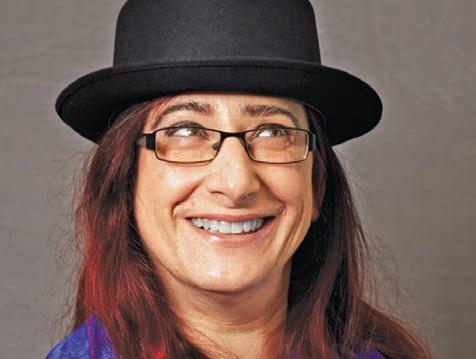
PH OTO BY D AVID STU CK Jacob Bradshaw and Lauren Burnett restrictions were limited to spouses only. In April, Bradshaw and Burnett said they hoped to have their wedding ceremony and party in October. However, they were preparing to postpone if coronavirus was still a threat.
84 DEAD OF COVID19 AT HEBREW HOME In April, news broke that four residents of the Hebrew Home of Greater Washington in Rockville had died from COVID19. Another 37 residents there tested positive for coronavirus.
The Hebrew Home is a nursing home, part of the Charles E. Smith Life Communities and has 556 beds. Rabbi Alana Suskin is often seen in her late father’s pork pie hat and plaid blazer. The Rockville resident is cofounder of interfaith organization Pomegranate Initiative, senior managing editor of progressive blog Jewschool. com and co-chair of the Maryland Poor People’s Campaign.
She was ordained first as a Conservative rabbi in 2003, but over the years felt more connected to Orthodox Judaism. So she enrolled in Yeshivat Maharat’s Advanced Kollel: Executive Ordination Track. The group
WJW reached out to Charles E. Smith Life Communities for more information and received an emailed response from trains and ordains Orthodox women and has received Mitchell Schmale of Nevins & Associates, a strategic communications fi rm. backlash from some Orthodox organizations for doing
“We have been following guidance from the Centers for Disease Control and Prevention (CDC), as well as the Centers so. Suskin said she attended the program out of a love for Medicare and Medicaid Services (CMS), and continue to work closely with local, state and federal public health for learning. agencies as we respond to the novel coronavirus (COVID-19) and the unique threat it presents to the older adults we serve,” Schmale wrote. ANNOUNCED CLOSURE OF MISLER CENTER ADULT CARE SURPRISES FAMILIES News of the Jewish Council for the Aging closing its senior adult day center in February came as a shock to many. The Albert & Helen Misler Adult Day Center served about 35 seniors a day with activities and kosher lunches. It closed on March 20. 7 JCA CEO David Gamse said the center lost $2,000 a day. The high cost was attributed to having to employ one sta member for every three or four persons in its care. Gamse also said JCA was required to provide highly specialized paratransit transportation service for those participants, which added to the costs. The JCA board and sta considered several options to cut costs, such as eliminating the center’s on-site entertainment and fi eld trips, serving non-kosher food or ending the ElderBus transportation service, Gamse said. The Albert & Helen Misler Adult “We said no to all of those things because it isn’t in our DNA to deliver a program that is anything less than top rate,” Day Center in Rockville. Gamse said. “We believe that would be a disservice even greater than the closure of our beloved Misler.”
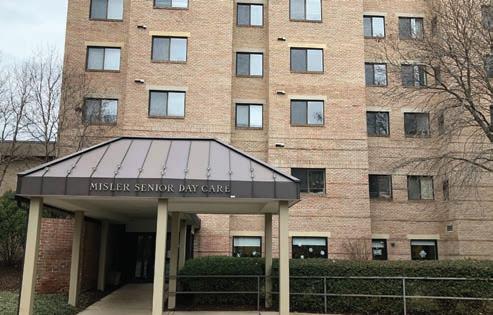
6
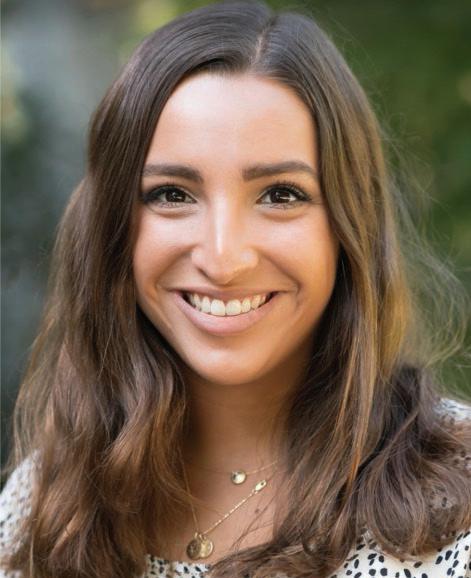
Shelly Peskin
PH OTO COU RTESY OF SH ELLY PESKIN
YOU SHOULD KNOW… SHELLY PESKIN Each week WJW interviews an adult younger than 40 for our You Should Know series, but the only one to crack the top 10 was the interview with Shelly Peskin. The piece was published in June and focused on the 23 year old’s experience as an Avodah Corps member in Washington. Through CASA de Maryland, she helped immigrants navigate government bureaucracy and paperwork. Here’s one of the questions writer Emma R. Ayers asked her:
Q: Obviously, there are so many people in need of help. What can the Jewish community do to best serve immigrants in need of help? What changes need to be made?
A: The Jewish community can help by being allies to the immigrant community. So step up, be involved. There are so many changes to be made, including being more educated about barriers immigrants face every day. We were once strangers in the land of Egypt and we have an obligation to pursue social justice for all. STAYING BUSY WITH SUSAN AND BRAD STILLMAN In September, Susan and Brad Stillman were honored for their service to the Jewish community. The Jewish Community Relations Council of Greater Washington named the couple as 2020’s Sara and Samuel Lessans Community Leadership honorees.
Susan Stillman’s background includes serving as membership chair at Congregation Beth El of Montgomery County. She’s also co-chaired the Bender Jewish Community Center of Greater Washington’s book festival for two years and has been a city leader for Momentum and on The Friendship Circle of Maryland advisory board.
Brad Stillman is board vice chair of the Capital Camps and Retreat Center, on Momentum’s fi nance and budget committee and on the University of Maryland Hillel board. He has also served on several The Jewish Federation of Greater Washington’s committees and has chaired the Bender JCC board.
“The Stillmans are an extraordinary couple who embody Jewish values every day through the work they do for our
5community,” said Ron Halber, the JCRC’s executive director. “They are passionately engaged in so many Jewish agencies that positively impact the lives of thousands of people in our community and beyond.”
Brad and Susan Stillman
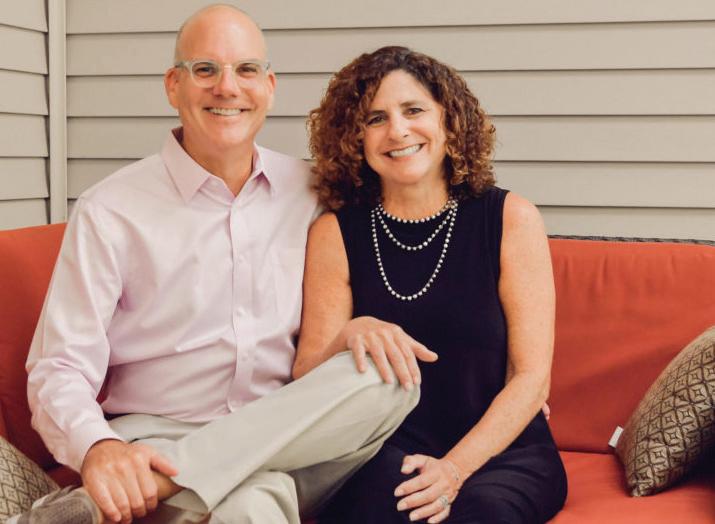
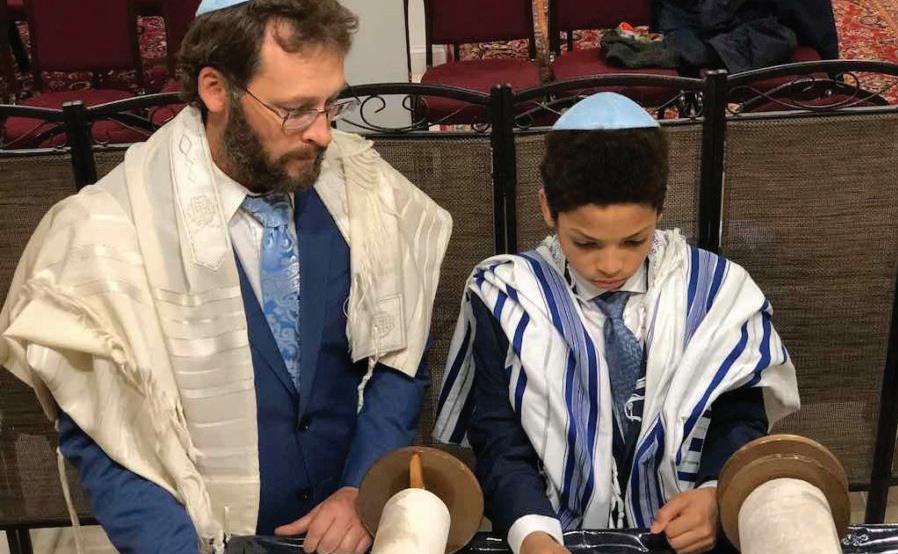
Shimma Wexler, right, and his father, Aaron.
4
PH OTO COU RTESY OF AARON W EXLER CORONAVIRUS COULDN’T STOP SHIMMA WEXLER’S BAR MITZVAH As many synagogues began to close their doors in March due to the pandemic, the Jewish Rockville Outreach Center remained open for Shimma Wexler’s bar mitzvah. An estimated 80 people were in attendance for the occasion.
At the time, Rabbi Yaacov Benamou said it was imperative that his center remain open, despite the decisions by schools and houses of worship to close.
Shimma’s father, Aaron Wexler, urged calm amid the confusion in the wider world.
3BARRY FREUNDEL’S SUDDEN RELEASE FROM JAIL WAS ANOTHER SHOCK TO HIS VICTIMS AND TO THE ORTHODOX COMMUNITY Convicted sex o ender Barry Freundel was released early from prison for good behavior in April. Freundel, an authority fi gure in Modern Orthodoxy, was arrested in 2014 for recording women as they changed in the National Capital Mikvah, which is attached to Kesher Israel Congregation in Georgetown, which he led as rabbi.
In the end, he pleaded guilty to 52 counts of misdemeanor voyeurism and was given a prison sentence of six years and four months. His original release date was for late 2021, but he ended up being released on April 1.
Emma Shulevitz, one of Freundel’s victims, was disheartened by the early release.
“I was thinking, is this an April Fool’s joke? He wasn’t supposed to be released so soon. It’s a little creepy that he is out there with no GPS bracelet or surveillance.” HACKERS LOOT $7.5 MILLION FROM WASHINGTON JEWISH ENDOWMENT In August it was discovered that the $7.5 million from the United Jewish Endowment Fund, an arm of The Jewish Federation of Greater Washington, had been diverted to international accounts. News of the theft was made public after The Federation’s board had been notifi ed in September and quickly made national headlines.
Federation CEO Gil Preuss told WJW the assets were taken from a single organization’s fund that the United Jewish Endowment Fund manages. The stolen $7.5 million would not a ect The Federation’s budget and allocations. Neither the endowment’s donor-advised funds nor the Federation’s own endowment were touched.
The theft is under investigation by federal and international law enforcement agencies. After the theft’s discovery, Preuss said, “Nobody is working from home computers anymore. Passwords have been changed.” 1HERE’S WHY FANS ARE LOOKING AHEAD TO A NEW SEASON OF ‘SHTISEL’ If there’s one thing our readers love, it’s the hit Israeli drama “Shtisel.” The show follows the members of the fi ctional Shtisel family who live in Geula, a haredi neighborhood in Jerusalem. The fi rst two seasons began streaming on Netfl ix in 2018, and season three is set to premiere next spring.
Washington resident Inger Mobley is a “Shtisel” fan. In fact, she’s watched the whole series twice since the pandemic started.
“I’m still stuck at home, and it made me feel like I had a place to escape,” Mobley said.
Before the quarantine, members of Mishkan Torah Synagogue in Greenbelt gathered for “Shtisel” watch parties. Rabbi Saul Oresky said the show is a thoughtful depiction of an Orthodox family.
“It showed people in this community to be really, truly fl eshed-out real people with a full range of human emotions, which is not sometimes how the rest of the Jewish world even sees those communities,” Oresky said. “They either idealize them or treat them as di erent creatures entirely.” eschucht@midatlanticmedia.com

@EricSchucht
2

PH OTO COU RTESY OF TH E W ASH IN G TON JEW ISH FILM FESTIVAL
The cast of “Shtisel.”

Pen pal program connects youths with seniors
COU RTESY OF CH ARLES A. SCH W ARTZ
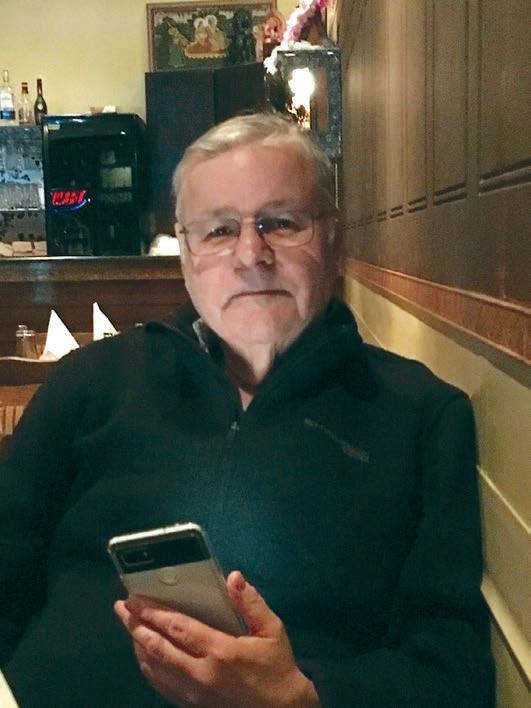

Sami Himmelfarb
By Eric Schucht Sta Writer
Sami Himmelfarb is 17. Charles Schwartz is 77. And although the two have never met, they’ve gotten to know each other pretty well. They’re pen pals, connected through Adas Israel Congregation in Washington.
The pen pal program was created to give teens something to do after many summer time activities were canceled due to the pandemic, according to Rae Grad, chair of the synagogue’s Hesed Committee.
“Over the summer, it was very evident that our teenagers in particular were truly bereft. They lost their opportunity to go to camp. They lost their opportunity to do typical summer programs,” Grad said. “So we thought, what can we do with these teenagers? What would be something that would fulfill them and create community? And so we came up with this idea of pen pals, which we’ve never done before.”
Eleven teens were paired with 11 seniors to correspond by handwritten letter. Sami, a senior at Charles E. Smith Jewish Day School, and Schwartz, a retired lawyer living in Chevy Chase, said they exchange one or two letters a month.
Sami sent the first letter in June introducing herself to RABBI AARON ALEXANDER Schwartz, who did the same in his response. Much of their writing at first focused on getting to know each other. But the correspondence soon shifted to everyday life.
Sami wrote of her experience on her school’s tennis team and the things she has learned in class about Judaism. Schwartz has written about his work, his childhood and his previous life in New York.
“So we’ve really been able to relate to each other, both with our interests, but also just sharing feelings of di culties with the pandemic and how we both missed being at synagogue for the High Holidays or seeing our family,” Sami said. “And it’s nice to have someone to talk to about that, that’s from a di erent generation and brings a new perspective that can also relate to your feelings and provide insight into how to cope.”
Sami said a handwritten letter is a new experience for her. The process forces her to think about every word she’ll say, as it takes e ort to write and there’s no delete button. It’s an art she’s come to find value in.
Adas Israel’s Rabbi Aaron Alexander said the pen pal program is a great way to connect members of the congregation at a time where social distancing is keeping them physically apart.
“Campaigns and programs like this are crucial. We fundamentally believe all deserve human connection. And because of that, it places an obligation on us to meet that particular human need,” Alexander said. “There is a particular delight in opening up a piece of mail and seeing another human being’s handwriting. It’s an experience that brings a little bit of unique joy into people’s lives.”
Sami and Schwartz said they plan to continue corresponding for the near future. That could end when Sami goes to study in Israel next year.
eschucht@midatlanticmedia.com @EricSchucht
Mohels keep the covenant going during pandemic
By Justin Regan
Between them, Moshe Rappaport and Michael Henesch have 70 years of experience working as mohels in the Washington area, performing tens of thousands of ritual circumcisions.
And though the pandemic rages on, Jewish boys continue to be born. And when they are eight days old, their parents want to enter them into the Jewish people with a mark symbolizing God’s relationship with the Jews. As God told Abraham in Genesis: “My covenant in your flesh is to be an everlasting covenant.”
It’s customary for a father to circumcise his son. But the father can ask someone to perform the circumcision — known as brit mila or bris mila — in his stead. That’s where the mohel, or circumciser, comes in. “It’s definitely an essential service for Jewish families, the Jewish people,” Henesch said. “There are many cases where we [mohels] try to perform this mitzvah. We walk in the snow, we walk in the rain, we drive hours sometimes to perform a bris.”
When lockdowns began in the spring, Henesch began telling parents he couldn’t do their son’s brit mila. Even though the ritual is supposed to be performed eight days after a boy is born, many families waited several weeks for Henesch to resume his work. And when he did, things changed. Masks came on, social distancing was enforced and only the parents were allowed to be present for what was once a large celebration. He’s since started allowing grandparents and other immediate family members to attend, but it’s still a small operation.
Rappaport said circumcisions can be small ceremonies. But even when all the requirements have been fulfilled, it often feels like something is missing.
“What’s been the most challenging is that I have not been able to shake hands or hug fathers or hug grandfathers,” said Rappaport. “After a bris is finished, everybody’s relieved and there’s happiness and there’s closeness and touching and shaking hands, and that hasn’t happened since COVID. That’s really been a real challenge for me.” A lot of the pomp has gone away — or gone virtual. “There could be 150 people in Zoom,” Rappaport said. “Sometimes, the people on Zoom, sometimes it’s a rabbi who will say a few words and sometimes it’s a relative. I once had a relative from Israel who was on Zoom and he’s the one who named the baby, from Israel. In the past, before all this, Zoom would never be used. If they couldn’t make it, they just wouldn’t be part of it. Now people can participate in this unique way.” Both Henesch and Rappaport work hard to assure parents of the levels of safety they take in their job, especially during the pandemic. They say their challenge is convincing

Rabbi Michael Henesch

COU RTESY OF H EN ESCH
families against having a non-ritual circumcision in the hospital.
Circumcision rates in the United States among the general population are dropping, too, according to the Centers for Disease Control.
Rappaport also said a hospital circumcision loses the important spiritual aspect of a brit.
“It’s a lifetime investment, this bris milah,” Rappaport said. “And it’s one of the few mitzvahs that has this lifetime guarantee. It stays with them and it helps this person during his lifetime. It’s not just a physical procedure. It’s a procedure that creates a lot of spirituality for the person, for the family and so forth.”
There is a halachically permissible “do-over” ceremony, known as a hatafat dam brit, that can be done if someone had a secular circumcision. It’s also a ritual many male converts go through. It’s hard to tell at this point if there will be an increase of those in 2021.
But in 2020, there’s no stopping Henesch and Rappaport. The singing and dancing may be on hold, but the covenant remains.
Henesch said operating in di cult times is a bit of a mohel tradition.
Henesch said one silver lining is that the lack of celebrations has led him to lose 20 pounds.




